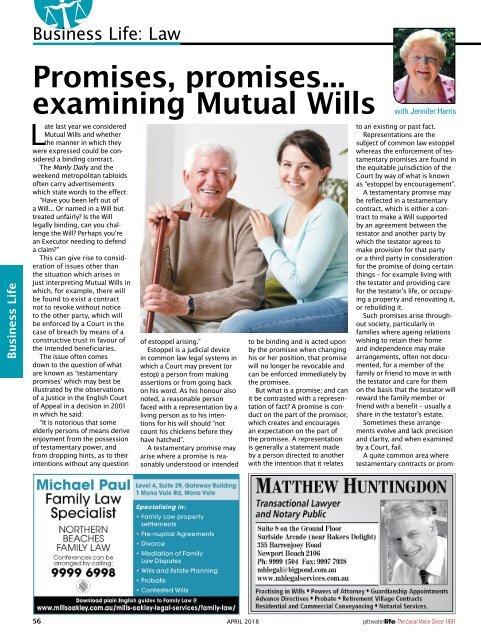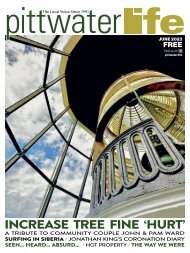Pittwater Life April 2018 Issue
Safety First: Reducing risk on Mona Vale Rd. We Will Remember: ANZAC Day. Tina Harrod: Island Life. 40 Years' Courtship: Careel Bay Tennis Club
Safety First: Reducing risk on Mona Vale Rd. We Will Remember: ANZAC Day. Tina Harrod: Island Life. 40 Years' Courtship: Careel Bay Tennis Club
Create successful ePaper yourself
Turn your PDF publications into a flip-book with our unique Google optimized e-Paper software.
Business <strong>Life</strong>: Law<br />
Business <strong>Life</strong><br />
Promises, promises...<br />
examining Mutual Wills<br />
Late last year we considered<br />
Mutual Wills and whether<br />
the manner in which they<br />
were expressed could be considered<br />
a binding contract.<br />
The Manly Daily and the<br />
weekend metropolitan tabloids<br />
often carry advertisements<br />
which state words to the effect:<br />
“Have you been left out of<br />
a Will... Or named in a Will but<br />
treated unfairly? Is the Will<br />
legally binding, can you challenge<br />
the Will? Perhaps you’re<br />
an Executor needing to defend<br />
a claim?”<br />
This can give rise to consideration<br />
of issues other than<br />
the situation which arises in<br />
just interpreting Mutual Wills in<br />
which, for example, there will<br />
be found to exist a contract<br />
not to revoke without notice<br />
to the other party, which will<br />
be enforced by a Court in the<br />
case of breach by means of a<br />
constructive trust in favour of<br />
the intended beneficiaries.<br />
The issue often comes<br />
down to the question of what<br />
are known as ‘testamentary<br />
promises’ which may best be<br />
illustrated by the observations<br />
of a Justice in the English Court<br />
of Appeal in a decision in 2001<br />
in which he said:<br />
“It is notorious that some<br />
elderly persons of means derive<br />
enjoyment from the possession<br />
of testamentary power, and<br />
from dropping hints, as to their<br />
intentions without any question<br />
to an existing or past fact.<br />
Representations are the<br />
subject of common law estoppel<br />
whereas the enforcement of testamentary<br />
promises are found in<br />
the equitable jurisdiction of the<br />
Court by way of what is known<br />
as “estoppel by encouragement”.<br />
A testamentary promise may<br />
be reflected in a testamentary<br />
contract, which is either a contract<br />
to make a Will supported<br />
by an agreement between the<br />
testator and another party by<br />
which the testator agrees to<br />
make provision for that party<br />
or a third party in consideration<br />
for the promise of doing certain<br />
things – for example living with<br />
the testator and providing care<br />
for the testator’s life, or occupying<br />
a property and renovating it,<br />
or rebuilding it.<br />
Such promises arise throughout<br />
society, particularly in<br />
families where ageing relations<br />
wishing to retain their home<br />
and independence may make<br />
arrangements, often not documented,<br />
for a member of the<br />
family or friend to move in with<br />
the testator and care for them<br />
on the basis that the testator will<br />
reward the family member or<br />
friend with a benefit – usually a<br />
share in the testator’s estate.<br />
Sometimes these arrangements<br />
evolve and lack precision<br />
and clarity, and when examined<br />
by a Court, fail.<br />
A quite common area where<br />
testamentary contracts or promof<br />
estoppel arising.”<br />
Estoppel is a judicial device<br />
in common law legal systems in<br />
which a Court may prevent (or<br />
estop) a person from making<br />
assertions or from going back<br />
on his word. As his honour also<br />
noted, a reasonable person<br />
faced with a representation by a<br />
living person as to his intentions<br />
for his will should “not<br />
count his chickens before they<br />
have hatched”.<br />
A testamentary promise may<br />
arise where a promise is reasonably<br />
understood or intended<br />
to be binding and is acted upon<br />
by the promisee when changing<br />
his or her position, that promise<br />
will no longer be revocable and<br />
can be enforced immediately by<br />
the promisee.<br />
But what is a promise; and can<br />
it be contrasted with a representation<br />
of fact? A promise is conduct<br />
on the part of the promisor,<br />
which creates and encourages<br />
an expectation on the part of<br />
the promisee. A representation<br />
is generally a statement made<br />
by a person directed to another<br />
with the intention that it relates<br />
with Jennifer Harris<br />
56 APRIL <strong>2018</strong><br />
The Local Voice Since 1991

















